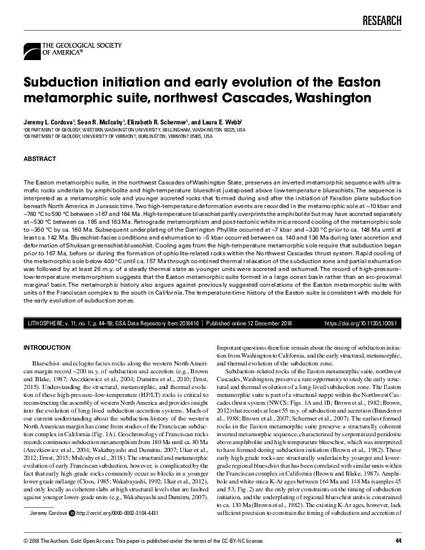
- Easton metamorphic suite,
- Metamorphism,
- Subduction zones
The Easton metamorphic suite, in the northwest Cascades of Washington State, preserves an inverted metamorphic sequence with ultramafic rocks underlain by amphibolite and high-temperature blueschist juxtaposed above low-temperature blueschists. The sequence is interpreted as a metamorphic sole and younger accreted rocks that formed during and after the initiation of Farallon plate subduction beneath North America in Jurassic time. Two high-temperature deformation events are recorded in the metamorphic sole at ∼10 kbar and ∼760 °C to 590 °C between >167 and 164 Ma. High-temperature blueschist partly overprints the amphibolite but may have accreted separately at ∼530 °C between ca. 165 and 163 Ma. Retrograde metamorphism and post-tectonic white mica record cooling of the metamorphic sole to ∼350 °C by ca. 160 Ma. Subsequent underplating of the Darrington Phyllite occurred at ∼7 kbar and ∼320 °C prior to ca. 148 Ma until at least ca. 142 Ma. Blueschist-facies conditions and exhumation to ∼5 kbar occurred between ca. 140 and 136 Ma during later accretion and deformation of Shuksan greenschist-blueschist. Cooling ages from the high-temperature metamorphic sole require that subduction began prior to 167 Ma, before or during the formation of ophiolite-related rocks within the Northwest Cascades thrust system. Rapid cooling of the metamorphic sole below 400 °C until ca. 157 Ma through combined thermal relaxation of the subduction zone and partial exhumation was followed by at least 26 m.y. of a steady thermal state as younger units were accreted and exhumed. The record of high-pressure–low-temperature metamorphism suggests that the Easton metamorphic suite formed in a large ocean basin rather than an arc-proximal marginal basin. The metamorphic history also argues against previously suggested correlations of the Easton metamorphic suite with units of the Franciscan complex to the south in California. The temperature-time history of the Easton suite is consistent with models for the early evolution of subduction zones.
Available at: http://works.bepress.com/elizabeth_schermer/22/
